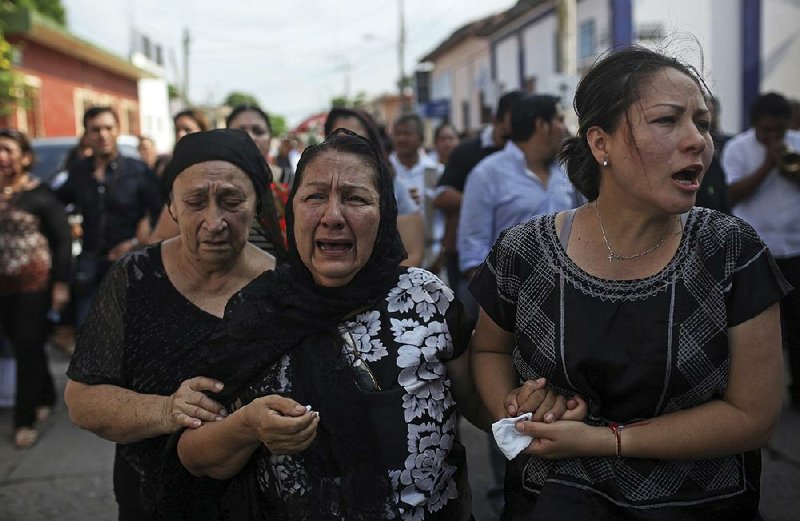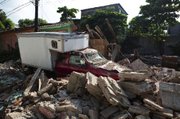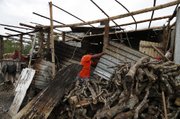JUCHITAN, Mexico -- Mexicans on Saturday began mourning some of the 67 people killed after a one-two punch from a monster earthquake and a Gulf Coast hurricane.
Hardest hit in the disasters was Juchitan in Oaxaca state where 37 people died when the magnitude-8.1 quake toppled buildings.
Funeral processions converged from all directions Saturday at one of Juchitan's cemeteries, sometimes causing temporary gridlock when they encountered one another at intersections.
The cemetery swelled with mourners and serenades for the dead. Pallbearers carried the coffins around rubble that the quake had knocked loose from the concrete crypts.
Jittery amid aftershocks, friends and relatives of the deceased held hushed conversations in the Zapotec language as they stood in the cemetery under umbrellas for shade from the beating sun.
Paulo Cesar Escamilla Matus and his family held a memorial service for his mother, Reynalda Matus Martinez, in the living room of her home, where relatives quietly wept beside her body.
The 64-year-old woman was working the night shift at a neighborhood pharmacy when the quake struck Thursday, collapsing the building.
"All the weight of the second floor fell on top of her," said her son, who rushed to the building and found her under the rubble. He and neighbors worked to dig her out but weren't able to remove her body until the next morning when civil defense workers arrived with a backhoe that could lift the debris.
Thursday night, amid fear of crime, the pharmacy had kept its doors locked, and Escamilla Matus wondered if that had cost his mother the time she needed to escape.
Scenes of mourning occurred again and again in Juchitan, where a third of the city's homes collapsed or are uninhabitable, President Enrique Pena Nieto said late Friday in an interview with the Televisa news network. Part of the City Hall collapsed.
The remains of brick walls and clay tile roofs cluttered streets as families dragged mattresses onto sidewalks to spend a second anxious night sleeping outdoors. Some of the people were newly homeless, while others feared that aftershocks could topple their cracked adobe dwellings.
Rescuers hunted for survivors with search dogs and used heavy machinery in the main square to pull rubble away from City Hall, where a missing police officer was believed to be inside.
The man's body was found Saturday afternoon in a collapsed passageway between City Hall offices and a market, according to a municipal police officer who was guarding the site. The officer declined to give his name because he was not officially authorized to give information to reporters.
The city's civil defense coordinator, Jose Antonio Marin Lopez, said similar searches had been going on all over the area.
Teams searching for victims in the collapsed Hotel Del Riohad, where one woman was killed, pulled four people, including two children, alive from the rubble.
"The priority continues to be the people," Marin said.
Larissa Garcia Ruiz was grateful to escape with only a broken arm when the quake hit as she and her family slept.
"I only woke up when I heard screaming," said the 24-year-old, cradling her wrapped arm.
Her mother managed to push the daughters and her blind husband through the back doorway before a large section of thick wall fell, trapping her. As Larissa Garcia Ruiz tried to help rescue her mother, another piece of rubble fell, breaking the younger woman's arm. Other relatives and friends finally managed to release the trapped woman.
All around them people yelled for help that night. "Nobody helped us," said her sister, Vicenta. "Everybody got out as best they could."
In addition to the deaths in Juchitan, the quake killed nine other people in Oaxaca and 19 in neighboring states. Two others died in a mudslide in the Gulf Coast state of Veracruz after Hurricane Katia hit late Friday.
Pena Nieto said authorities were working to re-establish supplies of water and food, and to provide medical attention to those who need it. He vowed that the government will help rebuild.
Electricity was cut at least briefly to more than 1.8 million people because of the quake, and authorities closed schools in at least 11 states to check them for safety.
The Interior Department reported that 428 homes were destroyed and 1,700 were damaged just in Chiapas, the state closest to the quake's epicenter.
Late Friday, Hurricane Katia hit land north of Tecolutla in Veracruz state, pelting the region with rains and packing maximum sustained winds of 75 mph.
Veracruz Gov. Miguel Angel Yunes said two people died in a mudslide related to the storm and that some rivers had risen to near flood stage, but there were no reports of major damage.
More than 4,000 people evacuated parts of Veracruz and neighboring Puebla states ahead of the storm.
The hurricane quickly lost strength after hitting land and was downgraded to a tropical storm.
The U.S. National Hurricane Center said the storm's maximum sustained winds had dropped Saturday morning to about 35 mph.
The Hurricane Center said Katia could still produce 3-6 inches of additional rain in a region with a history of mudslides and flooding.
Meanwhile, the earthquake's death toll appeared likely to rise as authorities continued to search the wreckage in southern Mexico.
The earthquake, one of the biggest in Mexico's history, was felt hundreds of miles away, in Mexico City, where people fled violently swaying buildings.
Aside from a few damaged buildings, the capital city was fine. That is thanks in part to its distance from the earthquake's epicenter but also because of an earthquake warning system and stricter building codes established after thousands of people were killed in the city and whole neighborhoods leveled in an earthquake in 1985.
In a televised address Friday, Pena Nieto declared three days of mourning.
"The power of this earthquake was devastating," Pena Nieto said. "But we are certain that the power of unity, the power of solidarity and the power of shared responsibility will be greater."
Information for this article was contributed by Christopher Sherman, Peter Orsi and Mark Stevenson of The Associated Press; and Kate Linthicum of the Los Angeles Times.
A Section on 09/10/2017



